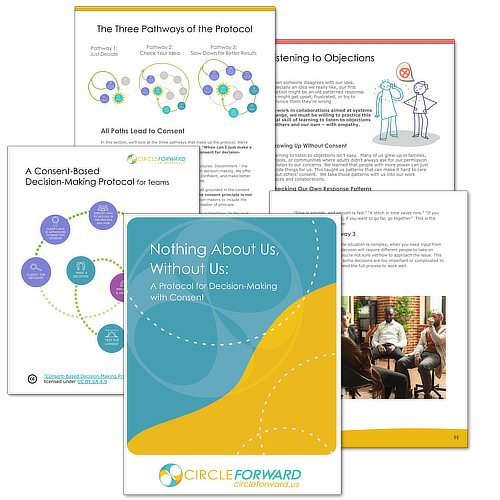Tom Atlee, Founder, Co-Intelligence Institute recently sent me some emails on the topic of consent and consensus. I enjoyed his perspective so much, I asked him if I could post what he wrote. He agreed, and here it is:
 Tom Atlee: I have only recently gotten a good glimpse of the heart of what you call “Consent”, after reading the Consent is a Third Option article. Having been involved with various consensus processes for many years, however, I think it is unfortunate that you have distanced Consent from that tradition. I’d rather see you frame Consent as a breakthrough version of consensus, that helps break out of the “tyranny of consensus” dynamics that often beset consensus efforts, as well as, minimizing the inefficiencies that are so often associated with it.
Tom Atlee: I have only recently gotten a good glimpse of the heart of what you call “Consent”, after reading the Consent is a Third Option article. Having been involved with various consensus processes for many years, however, I think it is unfortunate that you have distanced Consent from that tradition. I’d rather see you frame Consent as a breakthrough version of consensus, that helps break out of the “tyranny of consensus” dynamics that often beset consensus efforts, as well as, minimizing the inefficiencies that are so often associated with it.
I have the same frustration with Dynamic Facilitation — the most powerful process I know for conflict-transformation and breakthrough. Jim Rough, the founder, insists it is both not consensus and not deliberation, whereas I see it as an advanced form of both of those. I created the word “co-sensing” – which Jim likes – to express our shared sense of this phenomenon.
Part of what troubles me is the tendency to put many different processes together in one box labeled “consensus,” and then critique the whole box as if it is one thing.
I even have a book, Brian Muldoon’s The Heart of Conflict – much of it I like – which claims that consensus “results in homogeneity… makes meetings tedious and of doubtful utility… never discovers the dynamic ‘whole’ that lies underneath the parts… [and] assures that decisions will be based on the lowest common denominator.” This is SO far from everything I’ve ever experienced with consensus.
The fact that Consent moves towards “shared orientation,” by soliciting and addressing people’s concerns, is to me a (if not the) key dynamic in all of the best forms of consensus, in whatever different ways it is practiced. (In my lightly-held consensus-based co-op household, we simply make sure to ask for concerns before anything even begins to be finalized.)
In the most mainstream activist forms of consensus I’ve encountered – derived in secularized form from Quaker consensus – a “block” can only be accepted when it involves concerns about serious danger to the group, or a violation of its values. This is VERY close to what I understand about Consent. Furthermore, there is a stance called “standing aside”, which allows people to not block but to use their personal concerns as a way to distance themselves from the actual implementation of the agreement (a form of conscientious objection). There are also various forms of almost-agreement – like “consensus-minus-one” that are actually super majorities.
All these forms of consensus do not involve total agreement (which you seem to ascribe to consensus, per se), nor does the co-sensing form we use in my co-op house. There, we sense a shared understanding or orientation. If it turns out it is not shared or the situation changes, we recognize a new process of co-sensing needs to be undertaken (i.e., there isn’t an “agreement” that acts as a rule which must be adhered to). This is deeply kin to Consent’s “willingness to adjust and learn as we go”.
I realize that what I’m saying here is addressing the decision-making aspect of Consent, whereas Consent is much bigger than how decisions are made and embraces even the capacity to use any form of decision-making that the group consents to and which has a termination date (something that also applies to various forms of delegation, as well). All of which can apply to consensus, too, depending on how it is practiced.
All of which is to say I view (and will continue to view, unless I discover otherwise) Consent as something that includes and transcends the concern-addressing forms of consensus, expanding them and establishing constraints on what constitutes a valid concern (from the process perspective) in order to serve the efficiency of the ongoing activity.
So I’m excitedly appreciative of all of you who have created and articulated and are applying with this new way for groups to develop shared orientation. I’m also inviting you to think of your work and process as part of a larger exploration whose (arguably) most holistic thread has been called “consensus” and to realize thereby your profound kinship to very different leading-edge processes like Dynamic Facilitation.
Blessings on the Immense Journey we are all on together!
Thank you, Tom! We’ll continue this exploration around Consent vs. Consensus in our Deepening the Art of Facilitation online meet-up. Our monthly email newsletter includes upcoming topics for these meet-up. Get it when you sign up for our free Starter Kit or just drop us a note here.

